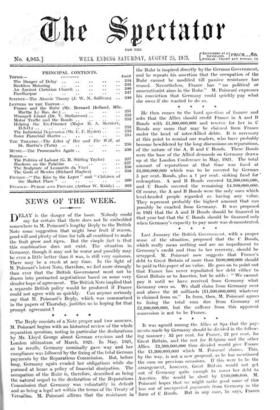The Reply consists of a Note proper and two annexes.
M. Poineare begins with an historical review of the whole reparation question, noting in particular the declarations by Mr. Lloyd George about German evasions and the London ultimatum of March, 1921. In May, 1921, as he recalls, Germany nominally gave way and her compliance was followed by the fixing of the total German payments by the Reparations Commission. But, before long, Germany again evaded her obligations while she pursued at home a policy of financial dissipation. The occupation of the Ruhr is, therefore, described as being the natural sequel to the declaration of the Reparations Commission that Germany was voluntarily in default and as being a legal act within the terms of the Treaty of Versailles. M. Poineare affirms that the resistance in the Ruhr is inspired directly by the German Government, and he repeats his assertion that the occupation of the Ruhr cannot be modified till passive resistance has ceased. Nevertheless, France has "no political or annexationist aims in the Ruhr." M. Poineare expresses his conviction that Germany could quickly pay what she owes if she wanted to do so.


































